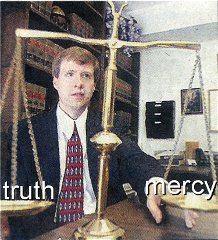Mandatory Education in Civility!?

The Illinois Supreme Court adopted new rules in September effective September 29, 2005, requiring CLE (Continuing Legal Education) and instruction in civility to combat what Chief Justice Thomas referred to as lawyer conduct which degenerates "into a Rambo-style, win-at-all cost attitude by attorneys." Beginning in 2006 every new lawyer admitted to practice will be required to complete a Basic Skills Course, totaling at least 15 hours of instruction. For the rest of us uncivilized attorneys if your last name begins with A - M you will have to complete 20 hours of CLE between July 1, 2006 and July 1, 2008 and 24 hours by July 1 every even year thereafter. If your last name begins with N - Z you will have to complete 20 hours of CLE between July 1, 2007 and July 1, 2009 and 24 hours by July 1 of every odd year thereafter. Part of that CLE must include training in civility.
The new rules further established a permanent Commission on Professionalism making Illinois only the 13th state to have such a commission. "The Commission's creation reflects the Illinois Supreme Court's commitment to elevating the overall level of professionalism within the Illinois legal community, as well as to identifying and addressing the sources of incivility and acrimony within the profession." Chief Justice Thomas said. I am glad that one of the members selected by the court to serve on this committee which he announced earlier this week was Patrick Kinnally. Mr. Kinnally won the pro bono public service award this year in Kane County and is an excellent attorney who should help steer the course in civility with some civility.
The committee which drafted the rule changes was chaired by attorney David Rolewick who said, "These new rules signal a change in how attorneys are expected to deliver their services to the citizens of Illinois... The Court has also identified divisiveness and bias as characteristics that must be eliminated from the legal system of the state, providing our profession with an opportunity to be an example to the larger society rather than a reflection of it."
I strongly agree that our profession should serve as an example to the larger society, but despite media to the contrary, I believe we do that. I see attorneys helping the poor and those in need on a daily basis and they do it simply because they care and want to make a difference. These men and women may not be heralded by the press but they are making justice a reality for many in need. Divisiveness and bias are certainly not characteristic of their service. Rather like good Samaritan these men and women are helping individuals regardless of race, sex, national origin or any other status. In ancient Israel it was thought that there was no such thing as a good Samaritan because of racial and religious bias and in modern Illinois there is apparently no such thing as a good lawyer. Rather we are like the joke of the boy who asked his father at the cemetery why they buried two people in the same grave. "What do you mean?" asked the father. That tombstone reads, "Herein lies a lawyer and an honest man."
I think CLE and civility are good and I know we can do better, but rather than deplore the actions of a few I prefer to commend the actions of many who are carrying out what our legislators sought to encourage when adopting our Good Samaritan Act, 745 ILCS 49/1 et. seq. to encourage the "generous and compassionate acts" of our citizens "who volunteer their time and talents to help others." Contrary to popular belief, lawyers are doing that in fact Administer Justice exist for that purpose. We desire to show mercy and compassion to those in need. Regardless of race, ethnicity, religion or other differences our calling is caring. We believe the vast majority of attorneys share that calling and appreciate the volunteer attorneys who sacrificially serve others in need. We hope you will join us in our continuing efforts to administer justice for all!
 Thanksgiving Tribute to a Lawyer. That ought to get anyone's attention. How can you be thankful for a lawyer. Honestly I'm very thankful for the 49 attorneys who volunteer at Administer Justice and I'm not alone: "Thank you for empowering me to try to help myself. The quality, caring and kindness shown me was superior" "If I had money I would donate to help the funding of Administer Justice. This organization could mean a second chance for a lot of people." Those are but some of the recent comments received from individuals our attorneys have assisted. But I'm thankful for another attorney who asked a question, the answer to which has made a great difference in my life and in the life of many others.
Thanksgiving Tribute to a Lawyer. That ought to get anyone's attention. How can you be thankful for a lawyer. Honestly I'm very thankful for the 49 attorneys who volunteer at Administer Justice and I'm not alone: "Thank you for empowering me to try to help myself. The quality, caring and kindness shown me was superior" "If I had money I would donate to help the funding of Administer Justice. This organization could mean a second chance for a lot of people." Those are but some of the recent comments received from individuals our attorneys have assisted. But I'm thankful for another attorney who asked a question, the answer to which has made a great difference in my life and in the life of many others.
